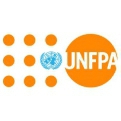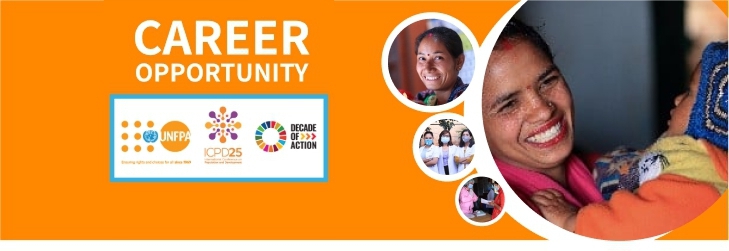


UNFPA, the United Nations Population Fund, is a voluntary-funded international organization with a presence in over 150 countries, including Nepal. UNFPA is guided by the Programme of Action of the 1994 Cairo International Conference on Population and Development (ICPD) and the Sustainable Development Goals. Its mission is to ensure that every pregnancy is wanted, every childbirth is safe and every young person’s potential is fulfilled.
The work of UNFPA is based on the premise that all human beings are entitled to equal rights and protections. We focus on women and young people because these are groups whose ability to exercise their right to sexual and reproductive health is often compromised. Our work is informed by an understanding of population dynamics, human rights and cultural sensitivity.
UNFPA in Nepal
UNFPA support to Nepal began in 1971 and has evolved in response to the changing national contexts. The new country programme is aligned to national priorities, the 2030 Agenda for Sustainable Development, the ICPD Programme of Action, the Convention on the Elimination of All Forms of Discrimination against Women, the UNFPA strategic plan, 2022–2025, and the UNSDCF, 2023–2027. The programme aims to contribute to and accelerate achievement of the 2030 Agenda, in particular SDGs 3 and 5 and the three UNFPA transformative results, in line with the Decade of Action.
UNFPA partners with the Government of Nepal, youth and women’s organizations and development partners to advance its mission. Under the 8th Country Programme and in line with its mandate, UNFPA Nepal is working around the following areas:
Sexual and reproductive health and rights: UNFPA is supporting national efforts in Nepal to improve the sexual and reproductive health of the most marginalized adolescent girls and women. The Fund is largely focusing on youth aged 15-24 and the most marginalized women addressing both the demand and supply sides of reproductive health services to improve access to information and services on maternal health, family planning, and sexually transmitted infections, including HIV.
Gender equality: UNFPA’s support to the Government of Nepal under this overarching theme seeks to ensure that vulnerable groups experience greater self-confidence, respect and dignity. We are building national capacity in the health sector to address gender-based violence (GBV), prevent child marriage and other harmful practices, and working to enhance the knowledge and capacity of men, women and communities to GBV.
Adolescents and youth: Investing in young people, especially the vulnerable and the marginalized, is a priority for UNFPA Nepal. The country has a large adolescent and youth population. Nepal is experiencing a demographic window of opportunity, a ‘youth bulge’. Nepali youth face several development challenges, including access to education, employment, gender inequality, child marriage, youth-friendly health services and adolescent pregnancy. Yet, with investments in their participation and leadership, young people can transform the social and economic fortunes of the country. UNFPA Nepal works with the government and partners to advocate for adolescents and youth’s rights and investments, including education, livelihood skills and health, including sexual and reproductive health.
Population dynamics: Population megatrends at the national and sub-national levels in Nepal continued rapid population growth, population aging, urbanization and migration — not only frame the entire development debate, they demand a reconsideration and re-conceptualization of what will be the main challenges for a new Nepal. Without an adequate understanding of how Nepal is changing from a demographic perspective, forward-looking planning and agenda setting will be of little value. Keeping this in mind, UNFPA Nepal is working with the government to ensure that national, sectoral and decentralized policies and plans address population dynamics and the interlinkages with gender equality, poverty reduction, the needs of young people, and reproductive health, including family planning.
UNFPA, the United Nations Population Fund, is a voluntary-funded international organization with a presence in over 150 countries, including Nepal. UNFPA is guided by the Programme of Action of the 1994 Cairo International Conference on Population and Development (ICPD) and the Sustainable Development Goals. Its mission is to ensure that every pregnancy is wanted, every childbirth is safe and every young person’s potential …
Views: 3511 | This job is expired 1 year, 3 months ago
No of Positions: 1 position
Type of Contract: National Individual Consultant
Duty Station: Kathmandu
Deadline: 19 January 2023 by 5 pm Nepal time
Duration: 3 Months
The UNFPA Nepal Country Office is currently implementing the Gender-based Violence Prevention and Response Phase II (GBVPR II) project (2020-2024).
The overarching goal of the project is to reduce all forms of gender-based violence (GBV) and discrimination against women and girls in 19 municipalities in Province 1 and Sudurpaschim Province. In pursuit of this goal, the project seeks to: (1) change discriminatory social and gender norms that uphold female subordination and violence against women and girls; (2) to enhance access to quality, multi-sectoral services for GBV survivors; and (3) to strengthen the policy environment and budget allocations for gender equality and GBV services.
The project is funded jointly by the Swiss Agency for Development and Cooperation (SDC), the Royal Norwegian Embassy in Nepal (RNE) and UNFPA.
As
part of the project, UNFPA will conduct a mid-term review (MTR). The purpose of
the MTR is two-fold: (1) to establish accountability to stakeholders on the
performance of the project and the invested resources; and (2) to support
learning and evidence-based adaptations of the project to ensure the
achievement of the intended outputs and outcomes and their sustainability.
Objectives
The objectives of the MTR are as follows:
MTR team
The MTR will be conducted by a team of two independent, external consultants. The team will consist of an internationally recruited team leader with overall responsibility for carrying out the review and a nationally recruited team member with competencies and skills that complements those of the team leader. The team leader and team member should collectively have the qualifications and experience to design and implement a methodology robust MTR that covers the intervention areas of the project.
Please see the attached terms of reference of the MTR for more details on the assignment.
How to apply
The application should include:
Only candidates who meet all qualifications and experience will be contacted for further consideration.
A full job description of the position can be accessed via link UNFPA External Career Site and only online applications using this link will be accepted.
Notice: There is no application, processing or other fee at any stage of the application process. UNFPA does not solicit or screen for information in respect of HIV or AIDS and does not discriminate on the basis of HIV/AIDS status. UNFPA provides a work environment that reflects the values of gender equality, teamwork, embracing diversity in all its forms, integrity and a healthy balance of work and life. We are committed to maintaining our balanced gender distribution and therefore encourage women to apply. UNFPA promotes equal opportunities for all, including persons with disabilities.
For Detailed ToR Please "CLICK HERE"
This job has expired.




